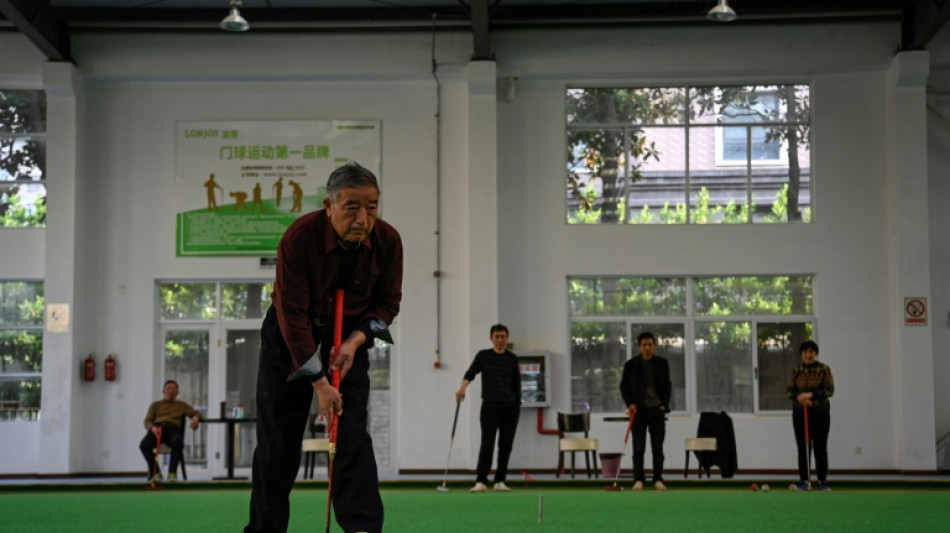
-
 England captain Stokes suffers facial injury after being hit by ball
England captain Stokes suffers facial injury after being hit by ball
-
Italy captain Lamaro amongst trio set for 50th caps against Scotland

-
 Piastri plays down McLaren rivalry with champion Norris
Piastri plays down McLaren rivalry with champion Norris
-
ECB holds interest rates as strong euro causes jitters

-
 Spain, Portugal face floods and chaos after deadly new storm
Spain, Portugal face floods and chaos after deadly new storm
-
EU close to sealing trade deal with Australia

-
 German Cup final to stay in Berlin until 2030
German Cup final to stay in Berlin until 2030
-
What does Iran want from talks with the US?

-
 Taming the lion: Olympians take on Bormio's terrifying Stelvio piste
Taming the lion: Olympians take on Bormio's terrifying Stelvio piste
-
Wind turbine maker Vestas sees record revenue in 2025

-
 Italy's Casse tops second Olympic downhill training
Italy's Casse tops second Olympic downhill training
-
Anti-doping boss 'uncomfortable' with Valieva's coach at Olympics

-
 Bitcoin under $70,000 for first time since Trump's election
Bitcoin under $70,000 for first time since Trump's election
-
'I am sorry,' embattled UK PM tells Epstein victims

-
 England's Brook predicts record 300-plus scores at T20 World Cup
England's Brook predicts record 300-plus scores at T20 World Cup
-
Ukraine, Russia swap prisoners, US says 'work remains' to end war

-
 Wales' Rees-Zammit at full-back for Six Nations return against England
Wales' Rees-Zammit at full-back for Six Nations return against England
-
Sad horses and Draco Malfoy: China's unexpected Lunar New Year trends

-
 Hong Kong students dissolve pro-democracy group under 'severe' pressure
Hong Kong students dissolve pro-democracy group under 'severe' pressure
-
Germany claws back 59 mn euros from Amazon over price controls

-
 Germany claws back 70 mn euros from Amazon over price controls
Germany claws back 70 mn euros from Amazon over price controls
-
VW and Stellantis urge help to keep carmaking in Europe

-
 Stock markets drop amid tech concerns before rate calls
Stock markets drop amid tech concerns before rate calls
-
BBVA posts record profit after failed Sabadell takeover

-
 UN human rights agency in 'survival mode': chief
UN human rights agency in 'survival mode': chief
-
Greenpeace slams fossil fuel sponsors for Winter Olympics

-
 Greenpeace slams fossel fuel sponsors for Winter Olympics
Greenpeace slams fossel fuel sponsors for Winter Olympics
-
Kinghorn, Van der Merwe dropped by Scotland for Six Nations opener

-
 Russia says thwarted smuggling of giant meteorite to UK
Russia says thwarted smuggling of giant meteorite to UK
-
Salt war heats up in ice-glazed Berlin

-
 Liverpool in 'good place' for years to come, says Slot
Liverpool in 'good place' for years to come, says Slot
-
Heathrow still Europe's busiest airport, but Istanbul gaining fast

-
 Highest storm alert lifted in Spain, one woman missing
Highest storm alert lifted in Spain, one woman missing
-
Shell profits climb despite falling oil prices

-
 Pakistan will seek govt nod in potential India T20 finals clash
Pakistan will seek govt nod in potential India T20 finals clash
-
China shuns calls to enter nuclear talks after US-Russia treaty lapses

-
 German factory orders rise at fastest rate in 2 years in December
German factory orders rise at fastest rate in 2 years in December
-
Nigeria president deploys army after new massacre

-
 Ukraine, Russia, US start second day of war talks
Ukraine, Russia, US start second day of war talks
-
Nepal's youth lead the charge in the upcoming election

-
 Sony hikes forecasts even as PlayStation falters
Sony hikes forecasts even as PlayStation falters
-
Rijksmuseum puts the spotlight on Roman poet's epic

-
 Trump fuels EU push to cut cord with US tech
Trump fuels EU push to cut cord with US tech
-
Fearless talent: Five young players to watch at the T20 World Cup

-
 India favourites as T20 World Cup to begin after chaotic build-up
India favourites as T20 World Cup to begin after chaotic build-up
-
Voter swings raise midterm alarm bells for Trump's Republicans

-
 Australia dodges call for arrest of visiting Israel president
Australia dodges call for arrest of visiting Israel president
-
Countries using internet blackouts to boost censorship: Proton

-
 Top US news anchor pleads with kidnappers for mom's life
Top US news anchor pleads with kidnappers for mom's life
-
Thailand's pilot PM on course to keep top job

| CMSC | -0.6% | 23.52 | $ | |
| GSK | 2.35% | 58.62 | $ | |
| RIO | -2.83% | 93.83 | $ | |
| BCC | -0.36% | 89.915 | $ | |
| BCE | -3.54% | 25.43 | $ | |
| NGG | -1.4% | 86.61 | $ | |
| JRI | 1.09% | 13.29 | $ | |
| RBGPF | 5.11% | 86.52 | $ | |
| AZN | 1.16% | 189.85 | $ | |
| BTI | 0.1% | 61.705 | $ | |
| RELX | 3.87% | 30.98 | $ | |
| VOD | -6.56% | 14.743 | $ | |
| BP | -2.34% | 38.3 | $ | |
| RYCEF | -1.87% | 16.62 | $ | |
| SCS | 0.12% | 16.14 | $ | |
| CMSD | -0.13% | 23.869 | $ |

China's elders savour twilight years as the young toil
At the end of a back alley surrounded by dilapidated buildings, the pitter-patter of ping-pong balls echoes around a cavernous warehouse in a Chinese town north of Shanghai.
The members of this table tennis club in Rudong, a sleepy seaside county with one of the highest proportions of elderly residents in China, gather to exercise and catch up.
Rudong once played a pioneering role in the rollout of Beijing's one-child policy. Now, a school lies abandoned and overgrown with vines, while one local university offers courses to retirees.
China has officially been overtaken by India as the world's most populous nation, with Beijing recently announcing the population had shrunk last year for the first time in over six decades.
"If elderly people come here and play ping-pong, they feel it's good for them, then they stop playing cards," said Fu, a 56-year-old Rudong woman who opened the club in 2011.
Fu's one son has moved out of Rudong to find work in a city -- a common tale in recent decades as China transitioned away from central planning in favour of a market-driven economy.
"He's had a kid there," Fu said, but when asked if the couple were considering having another child, she said it was unlikely.
"The burden these days is too much."
Zhu, a club member in his sixties now retired from a career at China Telecom, told AFP the job market was incredibly challenging for China's youth.
"It's unlike our generation. In those days, we had assigned labour," said Zhu. "Not like today, when people have to rely on themselves to find work."
- Back to school -
AFP found a community grappling with the reality of a shrinking population, offering a stark glimpse of the demographic pressures facing the country as a whole.
The problem is especially pronounced in places such as Rudong, about 100 kilometres (60 miles) from Shanghai, where a surge in the elderly population is coinciding with an exodus of younger people.
The last census, published in May 2021, showed nearly 39 percent of people in the area were over the age of 60 -- more than double the national figure of 18.7.
The overall population was 880,006 -- down 115,977 from the previous count.
China's ruling Communist Party introduced birth control policies in the late 1970s amid concerns over the potential consequences of unbridled population growth as the country emerged from the tumultuous rule of Mao Zedong.
While the one-child policy was relaxed in 2016, its impacts are still clearly felt -- last year, China's fertility rate fell to one of the lowest levels in the world at 1.2 births per woman.
- 'Life is rich' -
The ageing population is piling pressure on younger Chinese forced to take care of elderly family members, as well as the country's welfare system.
It is common in China for older people to move into the homes of young relatives, but some elderly Rudong residents told AFP they maintain their health to alleviate pressure on their children.
"As long as we're healthy, the stress on our kids is less," said 67-year-old Wang Jianhua, clutching a wooden mallet for gateball, a game inspired by croquet.
"So participating in these activities is for ourselves, but it's also for them."
For many elderly Chinese, retirement is better than it has been for generations following decades of economic growth.
Walking her bike out of the front gate of a local university and chatting with a classmate, 74-year-old Ping told AFP she was banished to the countryside for five years to learn from rural workers during Mao's Cultural Revolution in the 1960s.
"Because of the Cultural Revolution, we didn't attend school," she said.
But she now takes classes in literature and traditional Chinese opera.
"We're having fun and studying at the same time," said Ping.
"Life is still quite rich."
M.AlAhmad--SF-PST
